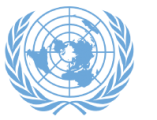Mr. President,
I would like to join others in congratulating the Dominican Republic on its presidency of the Security Council, and for bringing this important matter to the attention of the Council. The length of the speakers list shows the importance of this topic to Member States.
There is no doubt that climate change is the defining issue of our time, and I would like to thank Foreign Minister Manuel Vargas for convening today’s critical discussion. I would also like to thank this morning’s briefers for their presentations.
The UAE is committed to climate action, and we eagerly await the Secretary-General’s Climate Summit later this year. We applaud the Secretary-General’s leadership and his tireless work to fight climate change. We are proud to be hosting the Summit’s preparatory meeting in June in Abu Dhabi as announced by the Secretary-General yesterday.
Climate change has long ceased to be a concern only for environmentalists. Coping with climate change—or “adaptation” in the words of experts—is now a fact of life as UN Member States face extreme temperatures, increasingly intense natural disasters, and climate-influenced human migration. This adaptation is furthermore often synonymous with humanitarian relief and planning.
Though not strictly a security issue in the traditional sense of the word like other matters discussed before this Council, we must recognize that climate change will worsen existing security concerns in the future and potentially create new ones.
Military experts in many countries concluded long ago that the changing climate poses existential threats of displacement and extinction for some nations. Furthermore, food and water insecurity, the loss of shelter, the deterioration of livelihoods, and the sense of powerlessness in the wake of repeated disasters create breeding grounds for desperation, extremism, and instability.
The UAE is deeply concerned with the impact of these pressing climate-related challenges not only within our own borders, but around the world because we know that the security of our country is contingent on the security of others, and because we know that this is an issue that we can collectively tackle together.
The Security Council most recently recognized the link between climate change and instability in 2017. For example, terrorist groups, including Boko Haram, have capitalized on the dramatic shrinking of Lake Chad—over 90 percent in the last forty years—and recent droughts to recruit those who have lost their livelihoods as a result of climate-related insecurity.
In the Pacific and Indian oceans, climate change poses a threat to the very survival of many small island states. If we fail to act on climate change, a number of these countries could be continually devastated or even submerged under water, triggering population movements and creating new challenges around territorial control and integrity.
Mr. President,
Addressing the link between climate change and international security does not necessarily require a change in the mechanics of the Security Council, but we should do more to reframe climate action. Curbing greenhouse gas emissions and funding livelihoods in drought-stricken regions, though traditionally regarded as development or humanitarian matters, are in fact investments in security, and should be understood as such.
In general, Member States, donors, and the UN system need to explicitly target insecurity through climate action.
This could come in the form of commitments to scale up development work in places that are most likely to experience climate-linked insecurity or are already experiencing it. For example, many of the countries vulnerable to climate change have high unemployment rates, particularly among young people. Targeted development and humanitarian work that provides livelihoods, education, or training could mitigate the risk that climate-related unemployment contributes to insecurity.
Similarly, Member States, donors, and the UN system could combine their existing efforts to cut greenhouse gas emissions with a renewed effort to build resilient infrastructure in climate-vulnerable communities. For example, using solar energy to power health centers, schools, and businesses could simultaneously mitigate climate change and factors that contribute to insecurity.
Donor countries and international development agencies could also allocate their funding based on scientific models that predict where climate disasters are likely to occur. Forecast-based financing can build resilience in at-risk communities, and stem the fallout of a natural disaster that triggers insecurity and population migrations.
These are the kind of practical options and possible commitments we hope to showcase at the Climate Summit preparatory meeting in June in the UAE.
Today’s session is proof that the link between climate change and insecurity is real, and demands concrete attention from this chamber.
Thank you, Mr. President.


